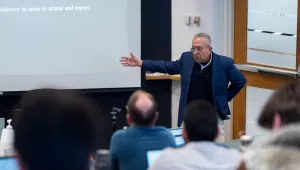From the Siege of Sinjar to the Battle for Baghuz: The Syrian Kurds, the United States, and Their Shared Fight Against ISIS
Speaker: John Holland-McCowan, Research Fellow, International Security Program
Since the Democratic Union Party (PYD) and their affiliated People's Protection Units (YPG) fighting forces gained world-wide attention with their role in rescuing the Yazidis on Sinjar Mountain in August of 2014, academics and policymakers have sought to understand these controversial, intertwined, and severely understudied organizations. To better understand what underpinned the PYD, the YPG, and the SDF’s success during this period, the speaker will present a history of the Syrian Kurds, their place within the Syrian civil war, as well as discuss his doctoral research’s other key findings.
Everyone is welcome to join us via Zoom! Register before the seminar here:
https://harvard.zoom.us/meeting/register/tJwtf-GrqD8vGtVBS8UgEHr3gthdixHaZNAv




